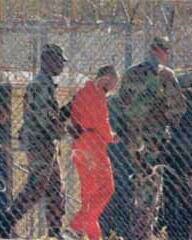|
 The Associated Press Published: March 1, 2007 The Associated Press Published: March 1, 2007
WASHINGTON: The Bush administration has charged an Australian who was captured in Afghanistan after the Sept. 11, 2001, attacks and held without trial ever since. David Hicks is the first terror-war suspect to face prosecution under a new system of military tribunals.
Hicks, a 31-year old former kangaroo skinner now held at the Guantanamo Bay U.S. military prison in Cuba, was charged with providing material support for terrorism and could face life imprisonment if convicted. Court challenges are certain before any trial.
Hicks' case, which has attracted broad attention in the United States and abroad, could well become the one that opponents of the new military tribunal system use to challenge the system at the U.S. Supreme Court. Opponents of the military commissions say they are illegal because they deny defendants many legal rights guaranteed under the U.S. Constitution.
"It all seems to be an intermingling of politics and pressure," said Jumana Musa, advocacy director for Amnesty International. "But none of it screams to me to be in the interest of justice."
Proponents of the new system say they expect the federal courts to rule in favor of the military commissions.
"I trust the system to judge Mr. Hicks fairly," said Republican Sen. Lindsey Graham, co-sponsor of the commissions legislation and a former military prosecutor. "It's long overdue this case be brought forward."
Meanwhile, Australia, a steadfast U.S. ally in the war on terror, has been pressuring the Bush administration to send Hicks back to his home country. That apparently would not come until after a trial at Guantanamo.
Last month, Sandra Hodgkinson, the State Department's deputy director for war crimes issues, told reporters, "It's certainly believed that Mr. Hicks may be able to carry out his incarceration, after the appeals process is complete, in Australia."
President George W. Bush and Congress established the new legal system last fall. Lawmakers set up the tribunals after the Supreme Court ruled an older version established by Bush was unconstitutional because it lacked Congress' blessing and violated international agreements.
"This is an important milestone for military commissions," said Navy Cmdr. J.D. Gordon, a Pentagon spokesman.
There are an estimated 385 detainees remaining at the Guantanamo prison in Cuba. None of the men held there on suspicion of links to al-Qaida or the Taliban has ever gone to trial.
Hicks was among 10 detainees who had been charged with crimes under the earlier law that the court struck down. Then, he had been charged with conspiracy, attempted murder and aiding the enemy.
Another of the 10 was Salim Ahmed Hamdan of Yemen, whose case ended up being the one the Supreme Court used to throw out the previous tribunal system.
According to Pentagon documents, Hicks went to Afghanistan in January 2001 to attend al-Qaida terrorist training camps. He also traveled to the southern city of Kandahar, the former Taliban stronghold, and stayed in an al-Qaida guest house where he met "shoe bomber" Richard Reid and other al-Qaida associates.
The Pentagon says that for about a year starting around December 2000, Hicks provided "support or resources to be used in preparation for, or in carrying out, an act of terrorism" and that he "knew or intended" for the support to be used for terrorism.
Last month, military prosecutors recommended that Hicks be charged with attempted murder for fighting coalition forces in Afghanistan and with providing support for terrorism.
On Thursday, Susan Crawford, head of the military commissions, formally charged Hicks only with providing material support for terrorism.
The Pentagon announcement did not explain why the attempted murder charge was dropped. But a package of talking points written for officials to answer questions on the announcement suggested Crawford did not believe the evidence warranted it.
Hicks' Pentagon-appointed lawyer, Marine Corps Maj. Michael Mori, said in Australia that the charge of providing support for terrorism was a fabrication that had not previously existed under the laws of war. He said Australian officials should not accept it.
"The Australians should demand that David be treated the same as an American citizen and that retrospective legislation should not be applied to him and he should be returned," Mori told Australian Broadcasting Corp. radio.
The military eventually hopes to charge 60 to 80 of the Guantanamo detainees. Once formal charges are filed, a timetable requires preliminary hearings within 30 days and the start of a jury trial within 120 days at Guantanamo.
Australian Prime Minister John Howard discussed Hicks' case with Vice President Dick Cheney when Cheney visited Australia last month. Under growing public pressure and with elections due this year, Howard has begun pushing U.S. officials to deal with Hicks' case more quickly.
- David Hicks Case Information
|


 The Associated Press Published: March 1, 2007
The Associated Press Published: March 1, 2007


